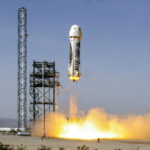A Billion Here, A Billion There
It must be really annoying to be so rich that bleeding hearts are always banging on about how you could single-handedly solve world poverty or whatever. So, here’s a suggestion to ease the pain for the world’s leading multi-billionaires: try cashing in on the wisdom of Benjamin Franklin: “It is prodigious the quantity of good that may be done by one man, if he will make a business of it.”
The business of aid agencies like the World Food Programme (WFP) is feeding the hungry, aiding development, and crisis management. They arguably do it better than anyone. What they do less well is the business of raising money to keep them in business.
In spite of having raised — entirely by voluntary donations — a record US$ 9.6 billion in 2021, WFP is $5.2 billion short of requirements.
Jeff Bezos, Richard Branson and Elon Musk, the multi-billionaires competing to fly in space (to lump them in corporate parlance — B, B & M), rightly pride themselves as being good at the business of making money because they are innovators.
A “merger” of their innovative business acumen and the expertise of aid agencies seems to me to be a win-win.
HOW DEEP IS YOUR NEED?
The WFP has worked out that if B, B & M committed $6 billion, they could keep 41 million people from starving this year.

To put that in perspective, the $5.5 billion it cost Bezos for the Blue Origin flight that he said gave him his “best day ever” (four minutes of being weightless), could have saved 37.5 million people who are getting more weightless by the day, and not having any fun doing it.
But let us not be too judgemental. It’s his money, and many of us spend money that could be given to a good cause on a holiday, for example.
And anyone who’s given a “one time donation” for a good cause knows the follow-ons end up being as annoying as telemarketers. There’s no reason to think being mega-rich would spare you that. Probably quite the contrary.
That’s where the benefits of a merger come in. Instead of handing over buckets of cash and then being bugged to do it over and over again, B, B & M (and any of their fellow Croesus-like contemporaries who might be interested) could try a new kind of innovation, an investment portfolio whose stakeholders are aid agencies with a proven track record and properly audited accounting practices.
True, it would be subject to market forces and the ups and downs that entails. The difference is that the money it earned would be used to keep people productive, which contributes to the overall well-being not just of the individuals, but in the long-run, economies, and therefore the companies that make up a portfolio.
For example: the International Fund for Agricultural Development works with rural communities to increase crop yields, develop entrepreneurial opportunities, adapt to climate change, and empower young people and women. The organisation is currently $350 million short of its next fundraising goal. (That’s the cost of the first 30 seconds of Jeff Bezos’ suborbital flight.)
HOW HIGH CAN YOU COUNT?
Elon Musk could offer the fund free expertise on avoiding taxes, too. According to a recent piece in the New York Times: “He has railed against federal subsidies but his companies have benefited from billions of dollars in tax breaks and other incentives from federal, state and local governments.”
Coincidentally, Musk, the richest man in the world at an estimated $249-billion, is set to collect a $23-billion bonus after Tesla reported record quarterly profits.

Puts a whole new spin on “Brother, can you spare a dime”, the Anthem of the Great Depression made famous by Bing Crosby and others, does it not?
When Laurence Tisch, a billionaire who bought CBS and set about trying to turn “the Tiffany network” into a costume jewelry outlet by asset-stripping it for cash, I asked the late, great Ed Bradley, who knew Tisch, why people who had more money than they could spend, wanted even more. Ed laughed and said; “So they can count it.”
Putting a few buckets of cash where it might make profit to put to much needed use would, if nothing else, make it (marginally) easier for B, B & M to count the rest.
And if that’s not incentive enough, they might also bear in mind a Persian proverb:“Every man goes down to his death bearing in his hands only that which he has given away.”
Comments are welcomed. Click CONTACT on the site header.
To receive e‑mail alerts to new posts, Click SIGN-UP.
8 thoughts on “A Billion Here, A Billion There”
Love this one Pizzey! The Devil is in how to convince a Musk (or any of the others) to bequeath less than one-fourth of his bonus to the WFP. I’ll send them the link to Pizzey’s Perch as a start.
thanks Chesh. I’ll let you know if I get Musk or Bezos as a perch subscriber. no bets on it though
So true. Good to come upon Ed’s name. Really miss him.
Working as I do in the chasm between the rich and the poor, I have come to loathe the super wealthy. It’s a terrible travesty that anyone can be as rich as that — and be labelled a ‘philanthropist’ or a generous benefactor and be thanked profusely when giving some of it away. Football players, golfers, tennis players, formula one drivers, movie stars, business magnates — they live in a world where money is not a thing, it is THE thing. And as a direct consequence of their wealth, others are deprived of everything unless someone behaves ‘charitably’. Its a cliche that the women of Africa, planting, hoeing, picking and cooking work harder than anyone else in the world — and like most cliches, it is (in my experience at least) true. Yet another reason to reject formal religion, which teaches people to be grateful to a god who gives them nothing but pain, hardship, grief, loss and uncertainty — and now the promise of dying in a world that has been made uninhabitable by those who are rich out of fossil fuels, jetliners, diesel engines, child labour and worthless luxuries.
I don’t have a problem with people being paid a lot of money if they do a job that earns it. My beef is with those who have much more than they can spend and don’t use it to help those who don’t have enough. The ought to put their “extra change” to use for something other than more toys, or as a way by which to measure themselves.
In a just world nobody wouldn’t have so much money that they can throw it around like that. Being rich doesn’t equate to being clever — only to be going good at making money. Which sometimes is more about other things than being clever anyway. I mind that rich people talk about earnings instead of takings. I mind that poor people are expected to be grateful to rich people for the crumbs on their tables. I’m working at the moment with communities that are so poor, they have — in objective material or measurable terms, nothing. I mind that they shit in the river where they bathe and wash their clothes and catch their supper, because there’s no sanitation or infrastructure. I mind that their dreams are as narrow as their horizons. I mind that rich people think they deserve billion dollar toys and trips into space while poor people think they should be grateful for the scraps — and cope with the fall out. Those guys don’t ‘earn’ that money, Pizz. There’s only 24 hours in each of our days and it simply can’t be possible for some to earn $1 and others to earn $1 billion in the same time period. They take it. They don’t earn it. I mind.
All good points. Being rich isn’t a crime; how you get that way can be, and how you spend it most definitely can be.
Good prsentation